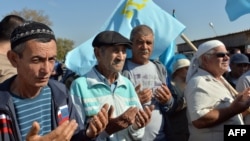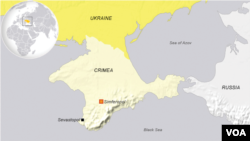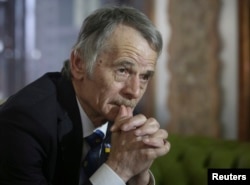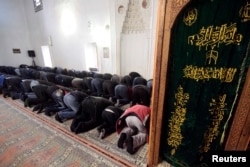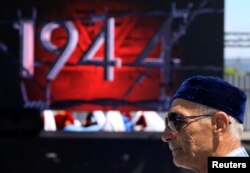Topuz Bakhtiyar’s large family was fast asleep in their first-floor apartment in a five-floor building on Tsvetochnaya Street in the city of Yalta, Crimea, early in the morning of February 12 when a group of heavily armed masked men broke the windows and stormed the apartment. Shouting commands in Russian, the raiders locked the women in one room, the kids in another, and searched the house. They then handcuffed Bakhtiyar and took him away, leaving the family in shock and with some bloody scratches from broken glass.
Bakhtiyar, 35, a skillful shoemaker and talented designer, remodeled the first floor, a former kindergarten, with his own hands after buying the place, which was nearly in ruins, from the city. His three children, wife, sister and nephew, all were in their rooms when the Russian security forces stormed in.
Bakhtiyar was taken to the Russian Federal Security Service (FSB) building and thrown into a cell, where he spent the next 12 hours. He was released around midnight, after an FSB officer informed him he was arrested for alleged extremism on suspicion of being a member of Hizbut Tahrir, an Islamic organization banned in Russia, but legal in Ukraine. Bakhtiyar’s relatives arranged his family’s escape to Kyiv, where he is now enrolled in college.
On Thursday, (June 2) four Crimean Tatars pleaded not guilty in a Russian court in the southern city of Rostov-on-Don after being arrested in their home city of Simferopol, Crimea, on extremism charges.
Living in fear
“Every morning I wake up thinking of home and afraid to check out the news, only bad things are happening over there,” said Bakhtiyar’s uncle, Enver Ochilov, who lives in New York City with his wife and daughter. Ochilov told VOA in a phone interview that his friends and relatives back in Crimea live in fear.
“They are afraid of Facebook posts, they are afraid of phone calls. I call and we speak about the weather,” he said. According to Ochilov, Crimean Tatar elders say because there have been many disappearances, young men should not walk alone on the streets.
Since Russia’s annexation of the Crimean peninsula from Ukraine in early 2014, there have been frequent reports of detentions, disappearances and mass arrests of Crimean Tatars. Russian security officials insist all the measures are aimed at preventing terrorist activities. Rights groups disagree, saying that Russia is accusing the Crimean Tatars of being Islamic extremists because the small ethnic group has never accepted Russia’s claim over their ancestral homeland.
“The crackdown on dissent in Crimea continues to deepen, as the few remaining independent journalists and other critical voices are methodically targeted,” U.S. Ambassador to the United Nations Samantha Power said in April. “As a result, virtually all forms of Tatar political expression and organization have effectively been criminalized.”
In March 2014, during the initial days of Crimea’s annexation, President Vladimir Putin reportedly telephoned Mustafa Dzhemilev, the leader of the Mejlis, the Crimean Tatar council, inviting him to a meeting in the Kremlin. Dzhemilev declined the Russian president’s invitation, instead calling for an immediate return of Crimea to Ukraine.
Brian Glyn Williams, a professor of Islamic history at the University of Massachusetts-Dartmouth, said Putin was “deeply offended” by Dzhemilev’s rejection of the invitation to meet.
“A photo with the Crimean Tatars’ leader would be such a powerful propaganda tool to use in efforts to legalize the occupation,” Williams told VOA. After Dzhemiev rejected the Russian leader's invitation, he said, "repression" was "inevitable.”
A 'Crimean Nelson Mandela'
Williams, who lived in Crimea while working on a book project, calls Dzhemilev a “Crimean Nelson Mandela” who would never accept the Russian occupation. Dzhemilev serves in the Ukrainian parliament and advocates internationally for an end to Russia’s occupation of the Black Sea peninsula.
In April 2014, a Russian court designated Dzhemilev as an “extremist” and banned him from entering Crimea or Russia for five years. This past January, a Russian court in Simferopol arrested Dzhemilev in absentia. The FSB added Dzhemilev to its list of most wanted fugitives. On May 20, a court in Moscow upheld the earlier ruling barring the Crimean Tatar leader from entering Russia.
On April 26, a Russian court banned the Crimean Tatars’ Mejlis, accusing it of “extremism.”
Crimean mosques have frequently been the targets of police raids and there have reportedly been mass detentions of parishioners. The latest such raid on a mosque resulted in a detention of about 50 Crimean Tatars, allegedly for not carrying their passports.
Deportation Memorial Day
In addition, the Russian-backed authorities in Crimea prevented residents from holding public commemorations marking Soviet dictator Josef Stalin’s mass deportation of the Crimean Tatars to Central Asia and parts of Russia on May 18, 1944.
“In the past on Deportation Memorial Day the whole nation used the gather and commemorate the victims of the tragedy. This year all public gatherings where banned,” Zair Smedlyaev, chairman of the election committee of the Kurultai, the Crimean Tatar elected representative council, told VOA in a phone interview from Simferopol.
Denied the right to come to streets on May 18, Crimean Tatars held community prayers in the cities and villages. All cars stopped at midday to honk simultaneously in a memory of the thousands of victims. Police briefly detained some of the drivers for disturbing the peace.
“Although the authorities did not give any specific explanation for banning public events on Memorial Day, everybody understood it wasn’t a coincidence,” Smedlyaev said.
Last December the Russian nationalist group “Sut Vremeni” (The Essence of Time) organized an exhibition in Simferopol “to honor the achievements” of Stalin.
“I went to see the exhibit,” said Smedlyaev. “I asked them nicely to remove Stalin’s portraits and those billboards praising a tyrant. They would not listen, so I pushed and turned their tables upside down. I knew it was a provocation, but what I did felt good.”




